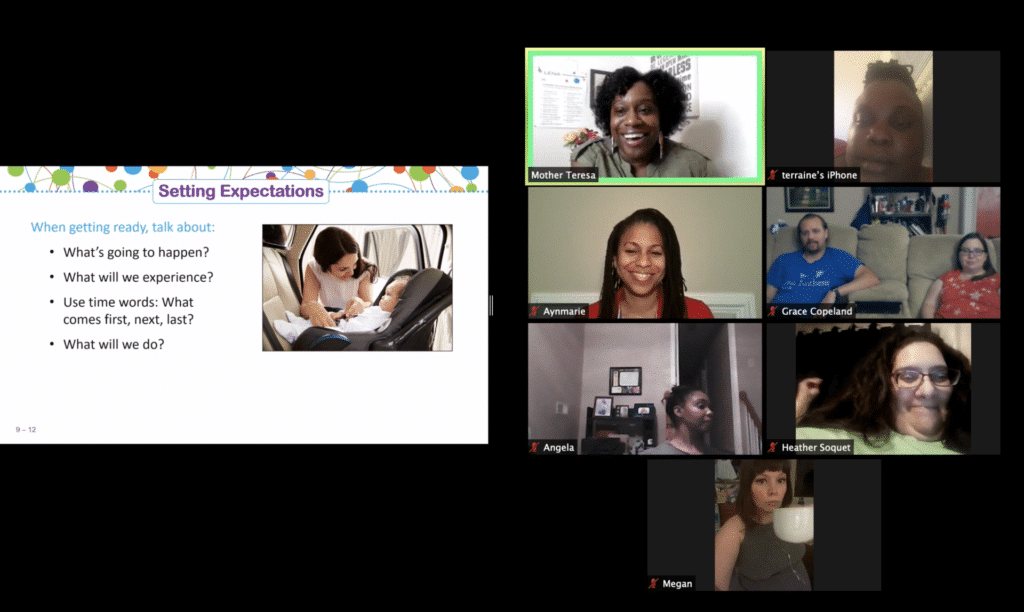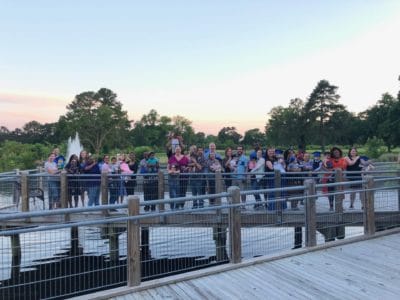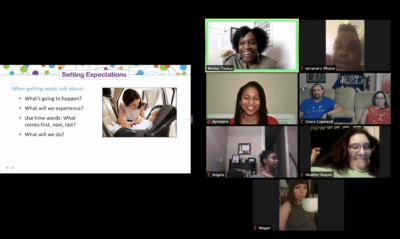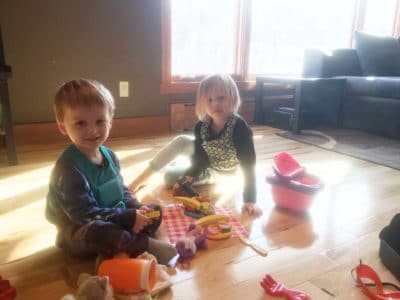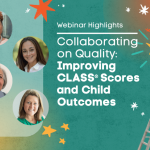Editor’s Note: Last fall, Bloomberg Philanthropies announced they would be funding a five-city replication of the successful Providence Talks initiative. One year later, a lot looks different for these cities as they work to navigate the hurdles of the pandemic. In spite of the unexpected, they have continued in their commitment to find ways to support caregivers and young children, and here we celebrate that work.
When the coronavirus pandemic hit, Barb Lito knew that she couldn’t afford to wait to transition to virtual programming for families and teachers.
For years, she has spearheaded an initiative in Virginia Beach, Virginia, to improve early literacy for children. The City of Virginia Beach created GrowSmart, a collaborative early childhood system approach that lives in the Department of Economic Development, to ensure children are born healthy, start kindergarten ready to learn, and are reading proficiently by third grade. Local reading assessments are showing declines in reading assessment scores for economically disadvantaged third graders and kindergarten readiness scores are showing slight declines.
“We have about 12 partners coming together monthly to ensure all kids have access to quality early education, start kindergarten ready to learn and meet literacy benchmarks. We want to align resources to show we have a coordinated system,” Lito, who serves as GrowSmart Coordinator, said.
The collaborative embarked on a path of discovery to see which models to boost early literacy work best in their community. In 2016, they began offering LENA Start parent-group classes for local families. GrowSmart program data collected with LENA technology show that on average, families in Virginia Beach increased adult words by 19 percentile points and conversational turns by six percentile points. Families who began the program with lower talk levels made even more significant gains, increasing adult words by 32 percentile points and conversational turns by 13 percentile points.
“When we saw that lower talk families were growing at almost twice the rate of all families, that energized us to say, hey, what if we tried home visiting, so we could connect with families on an even deeper level?” Lito said.
The team expanded to offer LENA Home, which uses “talk pedometer” technology during home visiting, and LENA Grow, which uses feedback-based coaching to provide professional development to early childhood educators.
“The LENA work is really taking a deeper dive into our kindergarten readiness approach. We’re trying to have a more meaningful impact, especially with families who may be starting behind already,” Lito said.
Early results are encouraging: within the last five years, the gap in scores on the PALS assessment between economically disadvantaged third-graders and the general population shrunk to just four percent.
Transitioning to virtual
That’s why, when in-person programs came to an abrupt halt this spring as the pandemic hit, Lito quickly consulted with her team to develop a strategy to reach caregivers virtually.
“We have to adjust our service to meet the needs of where families are right now,” she said. “Families still need us. Children are still developing. So how do we support healthy development where children are at? Right now, that is at home and child care centers. We need to support and encourage the parents, caregivers, and early education professionals now, so they can support the healthy development of the children in their care.”
After pivoting mid-session in the spring to virtual LENA Start classes, her team launched three all-virtual LENA Start classes in September, as well as virtual home visiting using LENA Home and virtual coaching for ECE teachers using LENA Grow. With mounting pressures on families and new safety procedures for child care providers, the team has found that caregivers are looking for support, she said.
“We’re asking, ‘How can we support caregivers in this changing world that they are having to navigate? We want to figure out the best way to connect with them – if virtual is it, that is what we will do. So far families love it,” she said. “We have to come together and figure out what we can do. I’m driven because we see the need and our charge is to respond and do something.”
Building community digitally
Initially, the team was uncertain about how the shift to virtual would be perceived. They polled parents who attended in-person LENA Start sessions at the beginning of the year and found that 80% were interested in virtual classes.
For many families, the program was the sole resource left as other services shut down. For the Copeland family, virtual LENA Start classes were a lifeline that provided them with the tools to boost their son’s language development after his speech therapy sessions were paused.
“For a while there, everything else shut down, but that’s when LENA was starting back up. So it still allowed us to work with him and develop his speech and learning. It was actually really great timing,” Grace Copeland said.
The desire and willingness of the Virginia Beach team to pivot so quickly to virtual classes spoke volumes to the family about the importance of early literacy, her husband Derrick said.
“When others said, ‘Hey, it’s COVID, it’s isolation, we have to shut down,’ the Virginia Beach facilitators were able to think outside the box and say, ‘Hold on, let’s find a way.It may not be perfect the first time, but let’s not stop, let’s keep trying.’ It was a very positive experience and also gave a very positive view on their willingness to want to share this with us. Not even COVID was going to stop them!” he said.
For another parent, Brandie Christian, LENA Start helped to replace some of the usual in-person brain-building activities she used to take her son to.
“I used to take my older son to the library all the time…but that was not available to us,” she explained. “I’m grateful we’ve had LENA because I understand the importance of language and everything that we can do to enrich and build our children’s brains. The class was really the only resource that we had.”
Coordinators AynMarie Carter and Teresa Hunter each led a virtual class session once a week, giving parents a much-needed opportunity to connect and de-stress.
“After a couple weeks, it didn’t even feel different from our normal LENA Start classes in person. I didn’t expect that,” Carter said. “When we started seeing the reports come in, we were like — Oh, it’s still working, it’s LENA! Families are retaining the information, they’re using the Talking Tips — it’s working, even though we’re on Zoom!”
The virtual setting also removed some of the traditional barriers to enrollment, such as transportation or scheduling issues.
“One of the biggest virtual opportunities it gave me was the schedule, was the opportunity to attend,” Derrick Copeland explained. “I would just close the work computer, come over to the living room, and be able to participate. That just increased my opportunity as a full-time, working adult to take the LENA course.”
As the first virtual class wrapped up this summer, any remaining doubts evaporated. The class had a strong 80% graduation rate, and parents shared that they loved the experience.
“We’ve had so many families who did not want it to end. Families were really engaged, they didn’t want it to end,” Carter, the coordinator, said.
Other LENA partners in other cities had a similar experience. To read more about how programs shifted to virtual implementation, click here, and for tips on building and maintaining engagement in a virtual context, click here.
